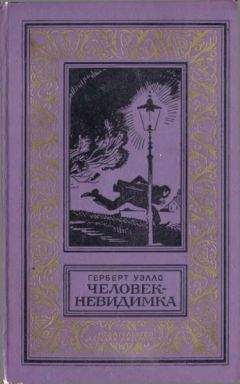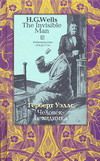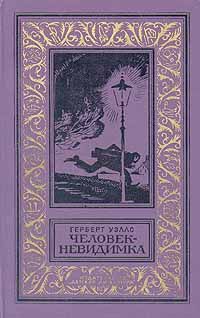H. Wells - Английский язык с Г. Уэллсом "Человек-невидимка"
envelope [`envqlqup], mania [`meInIq], breach [brJC]
“He is invisible!” he said. “And it reads like rage growing to mania! The things he may do! The things he may do! And he’s upstairs free as the air. What on earth ought I to do?”
“For instance, would it be a breach of faith if — ? No.”
He went to a little untidy desk in the corner, and began a note. He tore this up half written, and wrote another. He read it over and considered it. Then he took an envelope and addressed it to “Colonel Adye, Port Burdock.”
The Invisible Man awoke even as Kemp was doing this. He awoke in an evil temper, and Kemp, alert for every sound, heard his pattering feet rush suddenly across the bedroom overhead. Then a chair was flung over and the wash-hand stand tumbler smashed. Kemp hurried upstairs and rapped eagerly.
Chapter 19 (глава девятнадцатая)
Certain First Principles (некоторые основные принципы)
“What’s the matter (что случилось)?” asked Kemp, when the Invisible Man admitted him (спросил Кемп, когда Невидимка впустил его; toadmit— допускать, соглашаться; впускать).
“Nothing (ничего),” was the answer (был ответ).
“But, confound it! The smash (но, черт возьми, шум /почему/)?”
“Fit of temper (приступ раздражительности),” said the Invisible Man. “Forgot this arm (забыл про эту руку); and it’s sore (а она болит; sore— больной; болезненный, чувствительный; воспаленный).”
“You’re rather liable to that sort of thing (вы весьма подвержены подобного рода приступам; thatsortofthing— тому подобное, вещи такого рода).”
“I am (да).”
answer [`Rnsq], sore [sL], liable [`laIqbl]
“What’s the matter?” asked Kemp, when the Invisible Man admitted him.
“Nothing,” was the answer.
“But, confound it! The smash?”
“Fit of temper,” said the Invisible Man. “Forgot this arm; and it’s sore.”
“You’re rather liable to that sort of thing.”
“I am.”
Kemp walked across the room and picked up the fragments of broken glass (Кемп прошел через комнату с подобрал осколки разбитого стакана).
“All the facts are out about you (все про вас теперь известно; to be out — публиковаться; становиться общеизвестным),” said Kemp, standing up with the glass in his hand (сказал Кемп, вставая со стаканом в руках); “all that happened in Iping, and down the hill (все, что произошло в Айпинге и у холма). The world has become aware of its invisible citizen (мир узнал о своем невидимом гражданине). But no one knows you are here (но никто не знает, что вы здесь).”
The Invisible Man swore (Невидимка выругался; to swear — клясться; клясть; ругаться).
“The secret’s out (тайна раскрыта). I gather it was a secret (полагаю, это была тайна). I don’t know what your plans are (я не знаю, каковы ваши планы), but of course I’m anxious to help you (но, конечно, с готовностью вам помогу; anxious — озабоченный, беспокоящийся; сильножелающий).”
The Invisible Man sat down on the bed (Невидимка сел на кровати).
citizen [`sItIz(q)n], secret [`sJkrIt], anxious [`xNkSqs]
Kemp walked across the room and picked up the fragments of broken glass.
“All the facts are out about you,” said Kemp, standing up with the glass in his hand; “all that happened in Iping, and down the hill. The world has become aware of its invisible citizen. But no one knows you are here.”
The Invisible Man swore.
“The secret’s out. I gather it was a secret. I don’t know what your plans are, but of course I’m anxious to help you.”
The Invisible Man sat down on the bed.
“There’s breakfast upstairs (наверху сервирован завтрак),” said Kemp, speaking as easily as possible (сказал Кемп, /говоря/ как можно непринужденнее: «настолько непринужденно, насколько возможно»), and he was delighted to find his strange guest rose willingly (и с радостью увидел, что его странный гость охотно встал). Kemp led the way up the narrow staircase to the belvedere (Кемп повел его по узкой лестнице наверх, в бельведер).
“Before we can do anything else (прежде чем мы что-нибудь предпримем),” said Kemp, “I must understand a little more about this invisibility of yours (я должен узнать немного больше об этой вашей невидимости).”
He had sat down, after one nervous glance out of the window (Кемп сел, бросив нервный взгляд в окно), with the air of a man who has talking to do (с видом человека, которому предстоит /долгая/ беседа). His doubts of the sanity of the entire business flashed and vanished again (его сомнения насчет разумности всего происходящего снова быстро промелькнули и исчезли) as he looked across to where Griffin sat at the breakfast-table (когда он посмотрел через сервированный для завтрака стол туда, где сидел Гриффин) — a headless, handless dressing-gown (безголовый, безрукий халат), wiping unseen lips on a miraculously held serviette (вытиравший невидимые губы чудесным образом удерживаемой салфеткой).
glance [glRns], doubt [daut], miraculously [mI`rxkjulqslI], serviette ["sq:vI`et]
“There’s breakfast upstairs,” said Kemp, speaking as easily as possible, and he was delighted to find his strange guest rose willingly. Kemp led the way up the narrow staircase to the belvedere.
“Before we can do anything else,” said Kemp, “I must understand a little more about this invisibility of yours.”
He had sat down, after one nervous glance out of the window, with the air of a man who has talking to do. His doubts of the sanity of the entire business flashed and vanished again as he looked across to where Griffin sat at the breakfast-table — a headless, handless dressing-gown, wiping unseen lips on a miraculously held serviette.
“It’s simple enough — and credible enough (это довольно просто и вполне реально),” said Griffin, putting the serviette aside (сказал Гриффин, отложив салфетку в сторону) and leaning the invisible head on an invisible hand (и подперев невидимую голову невидимой рукой).
“No doubt, to you, but — (несомненно, для вас, но…)” Kemp laughed (Кемп засмеялся).
“Well, yes; to me it seemed wonderful at first, no doubt (ну да, мне это, конечно, сначала казалось поразительным). But now, great God (но теперь, Боже милостивый)!.. But we will do great things yet (но мы еще свершим великие дела)! I came on the stuff first at Chesilstowe (впервые я занялся этим вопросом в Чезилстоу; tocomeon— возникать /о вопросе/; наталкиваться).”
“Chesilstowe?”
credible [`kredqbl], laughed [lRft], wonderful [`wAndqf(q)l]
“It’s simple enough — and credible enough,” said Griffin, putting the serviette aside and leaning the invisible head on an invisible hand.
“No doubt, to you, but — ” Kemp laughed.
“Well, yes; to me it seemed wonderful at first, no doubt. But now, great God!.. But we will do great things yet! I came on the stuff first at Chesilstowe.”
“Chesilstowe?”
“I went there after I left London (a переехал туда после того, как покинул Лондон). You know I dropped medicine and took up physics (знаете, я бросил медицину и занялся физикой; totakeup— поднимать; подхватывать; браться /за что-либо/; заниматься /чем-либо/)? No? well, I did (не знаете? ну, в общем, это так). Light fascinated me (свет очаровал меня = я увлекся изучением света).”
“Ah (а-а)!”
“Optical density (оптическая плотность)! The whole subject is a network of riddles (весь этот вопрос — сеть загадок) — a network with solutions glimmering elusively through (сеть, сквозь которую неуловимо мерцают решения; elusive— ускользающий). And being but two-and-twenty and full of enthusiasm, I said (будучи всего лишь двадцати двух лет, полный энтузиазма, я сказал), ‘I will devote my life to this (я посвящу свою жизнь этому /вопросу/). This is worth while (он того стоит; worthone'swhile— стоит затраченного времени или труда).’ You know what fools we are at two-and-twenty (знаете, каким дураком бываешь в двадцать два)?”
“Fools then or fools now (дураком тогда или дураком теперь = может, это теперь мы дураки),” said Kemp.
medicine [`meds(q)n], physics [`fIzIks], enthusiasm [In`thjHzIxz(q)m]
“I went there after I left London. You know I dropped medicine and took up physics? No? well, I did. Light fascinated me.”
“Ah!”
“Optical density! The whole subject is a network of riddles — a network with solutions glimmering elusively through. And being but two-and-twenty and full of enthusiasm, I said, ‘I will devote my life to this. This is worth while.’ You know what fools we are at two-and-twenty?”
“Fools then or fools now,” said Kemp.
“As though knowing could be any satisfaction to a man (как будто знание может принести удовлетворение)!



